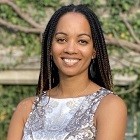Whether it was tackling a timely business case on inclusive hiring practices or hearing how equity advocacy efforts are transforming workplaces, Ivey’s MBA students learned about the power of equitable organizational leadership at this year’s MBA Showcase event.
The three-day event, held June 21-23, featured a series of complementary learning experiences, including a half-day workshop where students discussed the foundations of equity practice and were then asked to incorporate these practices into their thinking and planning through the hands-on use of Ivey’s Inclusive Planning tool.
The students also heard from a panel of Equity, Diversity and Inclusion (EDI) practitioners about how various organizational EDI initiatives are creating meaningful change. The event culminated with a case competition where students recommended ways the National Football League can improve diversity in its coaching ranks.
Embedding EDI in organizations
The goal of the event was to help students to understand the importance of embedding EDI practices into organizational operations, decision-making, and culture, says Associate Professor Adam Fremeth, HBA ’00, Faculty Director of Ivey’s Accelerated MBA and MBA programs.
“A deep understanding of the unique challenges and wealth of opportunities presented by organizational EDI initiatives is crucial training for future business leaders,” said Fremeth. “The MBA Showcase provides a deliberate pause in the busy MBA schedule, which gives students time to explore and discuss critical issues involving equity, diversity, and inclusion within the professional environment.”
Related to this story
Lessons from EDI advocates
A highlight of the event was a panel session with leaders who are advancing EDI at organizations. The discussion was hosted by Ivey’s Culture and Inclusion team and moderated by Ladan Mowlid, Senior EDI Associate. Here’s a look at the leaders’ journeys in this work and the advice they shared.
Halima Abshir – Mentorship matters
 Halima Abshir is an Agile Enablement Analyst at RBC
Halima Abshir is an Agile Enablement Analyst at RBC
While attending university as a first-generation student whose family is from Somalia, Halima Abshir recalls feeling out of place. It wasn’t until she received support from her manager during a summer role at RBC that she realized she was lacking mentorship. She has since made it her mission to mentor others. After later joining RBC full time and noticing that Black employees weren’t moving up as often as others at the firm, Abshir gathered valuable data that led to the creation of RBC’s first Black Employee Resource Group in 2020. She has continued to focus her efforts on advancing Black talent in a variety of ways. Some examples include working on programs that facilitate economic growth and educational opportunities for Black communities and supporting first-generation Somali students entering and navigating post-secondary education.
Her advice to students: Support others through mentorship and allyship
“Knowing there is a future generation coming, give some time back through mentorship to someone who would identify as you. Even for those who might not look like the next person, allyship speaks volumes.”
Nicole Kaniki – Education is essential
 Nicole Kaniki is the Director of Equity, Diversity, and Inclusion in Research and Innovation at the University of Toronto
Nicole Kaniki is the Director of Equity, Diversity, and Inclusion in Research and Innovation at the University of Toronto
Nicole Kaniki didn’t set out to get involved in EDI initiatives. But after seeing racism firsthand while growing up in South Africa during apartheid, educating others about EDI issues came naturally. In particular, she has contributed to making the research environment in academia more equitable through former roles at Western University and now the University of Toronto.
While Kaniki says change is slow because often organizational cultures are entrenched, education is key to moving the dial. As an example, she cited how publicity around George Floyd’s murder in the spring of 2020 was pivotal in getting people to at least listen to ideas for moving toward racial equality.
“As much as my work is about strategic meetings, these are mainly educational strategic meetings. I have to go in and not always get something done, but just educate people,” she said. “I always find I have to reeducate people in the moment so we’re all more or less at the same pace and then see if we can move just a little bit further. I have to be OK with that on a daily basis.”
Melanie Stone – Listen and learn
 Melanie Stone is the Accessibility and Inclusion Advisor with the City of London’s Anti-Racism and Anti-Oppression Division
Melanie Stone is the Accessibility and Inclusion Advisor with the City of London’s Anti-Racism and Anti-Oppression Division
Melanie Stone’s interest in accessibility and inclusion began at age 17 while she was a case worker helping people who were more reclusive to get out into the community. As she witnessed the barriers they faced, such as having to manoeuver wheelchairs up wooden planks to access washrooms, she became angry. That anger led her to become a voice for individuals living with disabilities.
Stone says a key to her success in this work is her ability to observe interactions and body language to assess when people have been harmed or feel uncomfortable. And when discussing EDI initiatives, listening to concerns from both proponents and opponents is an important way to find a middle ground or people who can contribute to the cause.
“For me, the biggest challenge was learning to watch and listen to know where I was best going to be able to make a difference,” she said. “Spend time, not talking or thinking about what your response is, but watch who’s hurt, who’s harmed, or who is not going to vote for what you need to go through at council … This can help you to figure out how to approach them.”
Carrying the torch
And if there’s one common theme to what the advocates have learned from this work, it’s that they can’t do it alone. That’s why educating the next generation of leaders is so important.
“Sessions like this are so important. We need to keep the conversation going.”
– Nicole Kaniki



